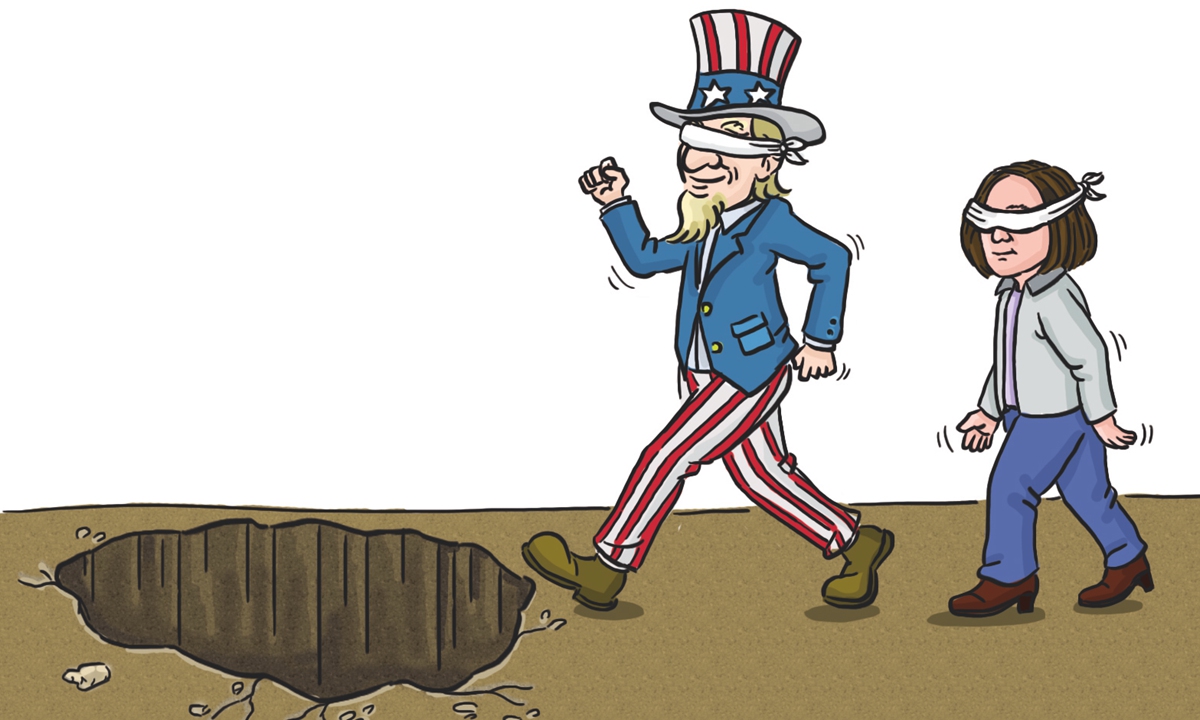US, Taiwan should not hype war across Straits: Global Times editorial
Source: Global Times Published: 2020/7/10 20:34:06

Illustration: Xia Qing/GT
The US State Department has approved a request from the island of Taiwan to recertify the US' Patriot Advanced Capability-3 (PAC-3) missiles for an estimated cost of $620 million, according to the US Defense Security Cooperation Agency on Thursday. This is not a large amount compared with the US' previous arms sales to Taiwan. It's an upgrade for Taiwan's PAC-3 missiles, and does not seem that much of an irritant. But analysts have noticed the normalization trend of US arms sales to Taiwan. In the past, the US and Taiwan would save up to make a larger transaction, but now Taiwan buys on demand, and the US approves it.
Most military observers believe that with the overwhelming improvement in the Chinese mainland's military power, Taiwan's purchase of any military equipment from the US has lost the actual significance of defense. Taiwan's annual defense budget is only around $11 billion. Deducting personnel and training expenses, the rest of the budget is not even worth mentioning compared to the PLA. Once a war breaks out, the PLA is capable of destroying Taiwan's overall military capabilities within a few hours and capturing the island hours after that. From the army to the people, the mainland has such confidence.
Thus, the military issue in the Taiwan Straits is no longer between the mainland and Taiwan, and is not about what military equipment Taiwan buys from the US. For the mainland, US arms sales to Taiwan is one major move to undermine the one-China principle. It is an important sign of the US and Taiwan colluding to escalate tensions in the Taiwan Straits, and also Washington's way to convey its attitude to Beijing - that it will try to dominate the Taiwan question.
By purchasing weapons from the US, Taiwan is paying protection fees to the country. The Taiwan military is not determined to really defend Taiwan's security. Taiwan's defense cannot be judged in a traditional way. It is only the result of a strategic balance. Such a balance has become increasingly sensitive because of the mainland's rapidly growing power, the US' unreasonable suppression of the mainland, and turning Taiwan into a pawn to curb the mainland's rise.
In the foreseeable future, the most important thing for Taiwan is to properly handle such a special balance. Taiwan's Democratic Progressive Party authority has a serious misjudgment. It wrongly believes that it can get everything it wants by purchasing weapons from the US and being a pawn of the US.
In a Crisis Watch report published by the International Crisis Group in June, the Taiwan Straits was in the list of "deteriorated situations." Taiwan suffers the most if the situation in the Taiwan Straits deteriorates. Once the situation erupts, the mainland and the US will both be harmed, but it may be a complete disaster for Taiwan.
We believe that the mainland, the US and Taiwan do not want the Taiwan Straits situation to spark because it benefits nobody. But China-US relations are tense and Taiwan island is hijacked by the Tsai Ing-wen authority's radical policies. The mainland almost has no mutual trust with the US or Taiwan, and all sides are showing their determination to respond to the worst situation. The risk of military conflicts in the Taiwan Straits is the highest in decades. Once the first shot is fired, there is very likely to be large-scale military conflicts caused by strategic misjudgment.
Here we warn the US and Taiwan: Do not play with fire in the Taiwan Straits. Once a war breaks out in the region, the mainland will be determined to defend national sovereignty at all costs. Such determination from the mainland overwhelms US attempts to benefit from the situation and Taiwan dissidents' will to seek so-called independence. No one wants a war, but compared to the US and Taiwan, the mainland is less afraid to fight in the region.
The US and Taiwan should ease the situation in the Taiwan Straits, instead of pushing the situation to the extreme. Otherwise, just wait for military conflicts to break out one day.
Posted in: EDITORIAL